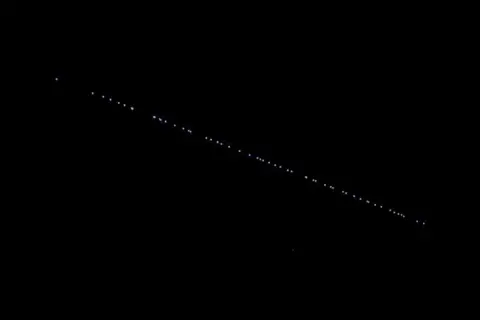Musk’s satellites ‘blocking’ view of the universe
By 2030 the number of satellites in orbit is expected to surpass 100,000.

Radio waves from Elon Musk’s growing network of satellites are blocking scientists’ ability to peer into the universe, according to researchers in the Netherlands.
The new generation of Starlink satellites, which provide fast internet around the world, are interfering more with radio telescopes than earlier versions, they say.
The thousands of orbiting satellites are “blinding” radio telescopes and may be hindering astronomical research, according to Netherlands Institute for Radio Astronomy (ASTRON).
SpaceX, which owns Starlink, has not replied to a request from BBC News for comment.
The satellites provide broadband internet around the world, often to remote places, including challenging environments like Ukraine and Yemen.
They are also used to connect remote areas of the UK to fast internet. In 2022 tests showed that Starlink could deliver internet speeds four times faster than the average, according to the Department for Digital, Culture, Media and Sport.
But astronomers say this comes at a cost.
“Every time more of these are launched with these kinds of emission levels, we see less and less of the sky,” Professor Jessica Dempsey, director of ASTRON, told BBC News.
“We’re trying to look at things like the jets, which are emitted from black holes in the centre of galaxies. We also look at some of the earliest galaxies, millions and millions of light years away, as well as exoplanets,” she said, highlighting the areas the satellite radiation is affecting.
Interference from the second generation, or V2, satellites was found by ASTRON to be 32 times stronger than the first generation.

![[]](https://gallery.mailchimp.com/0c5fce34d5ca05f64a13d085d/images/d448bc7c-2062-4560-aa67-bb51a73a4379.png)